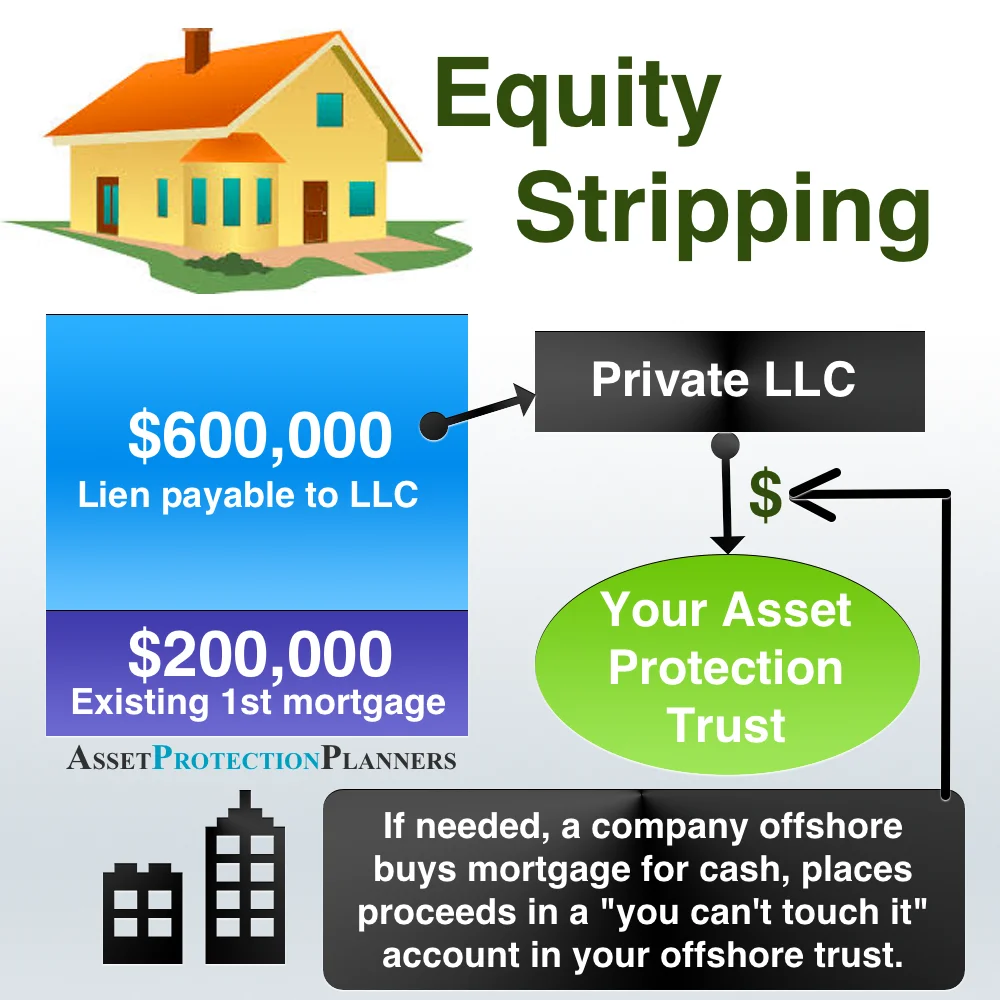Your home is probably one of your most important assets. It is not only the value but the security it provides; the sense of family togetherness, community, safety. If you cannot satisfy a large judgement, a big item on the list of creditor targets is the family home – your personal residence. If you do not have anything else that can satisfy a financial obligation, your home is often the asset with the most meat on the bone. So, what do you do to protect your home from lawsuits? That is what we will discuss. Here’s how to incorporate your primary residence into an asset protection plan and protect yourself from being a lawsuit victim.
So, how do you protect your house, you personal residence from creditors if someone sues you?
With your personal residence we do two things and sometimes three things:
- We put your home into a land trust for privacy.
This way, your name does not appear in the public records. When some attorney comes sniffing around for assets to see if they want to accept a contingency fee lawsuit against you, they find nothing. You don’t assign the land trust to an LLC and we’ll show why. - We record equity stripping liens against your property.
That is, we record mortgages or deeds of trust to pull out the equity. Note, we do that for most people who lives in states that don’t protect enough of your home equity. Now, #1 and #2 work in about 99% of the cases. But in 1% of the cases… - If needed, we later get a third-party lender to purchase those liens and put the proceeds into an asset protection trust.
We put the proceeds into an inaccessible account in an international asset protection trust.

Personal Residence Asset Protection vs. Rental Property
Now, the personal residence strategy is different from protecting real estate investments, rental properties. This is because your personal residence is in a different tax and legal category.
With rental properties, we set up land trusts trust for privacy of ownership. Then, we set up LLCs and you assign your beneficial interest in the land trust to an LLC. You do this for lawsuit protection and asset protection. See our video on this topic.
Why LLCs Don’t Work On Your Residence
-
For tax reasons.
If you put your home into an LLC, you could lose your mortgage interest write-offs. As you probably know, when you own a home you get to write off your mortgage interest to a certain limit. You could lose that if your property was in an LLC. Sam thing if your home is in a land trust with an LLC as beneficiary. This is because the IRS could say you are simply a tenant of LLC. So, the land trust / LLC combination works great for rental property but not for the house where you live.
Plus, when you sell your home for a profit if you’ve lived there for a couple years, you get a HUGE exemption on taxes. This is your personal residence capital gains exemption.
Under the current Section 121 exclusion, you get to put $250,000 of tax free profits in your pocket if you are single. $500,000 if you’re married. You must have lived in the house two out of the last five years. So, you can do that every two years. That’s huge.
You don’t get that tax benefit on places where you never lived, such as rental properties that you may own. Plus, you can lose that big tax break if the ultimate owner of your residence is an LLC. Again, the LLC works on investment properties but not your home. This is because the IRS gives different tax breaks to your personal residence than they do to income producing property where you don’t live.
Okay, so the loss of personal residence tax breaks is reason number one why we don’t put your home into an LLC.
-
Homestead exemption.
Reason number two is the homestead exemption. Google the term “Homestead protection by State” and you’ll see our website with our homestead video. On that page you’ll see a state-by-state chart of how much equity the law protects in each state. In Florida, if you have half an acre or less in a city or 160 acres outside the city limits, you can protect 100% of your equity from creditors.
At the moment O.J Simpson still owes over $35 million to the families of Nicole Brown Simpson and Ronald Goldman. Burt Reynolds was $5 million in debt when he bought a mansion just north of me in Jupiter Florida.
You lose that protection if you put your home into a company.
In Virginia, if a married couple gets into a lawsuit together and they have a million dollar home. The creditor gets 990,000 and the couple only gets $10,000 because that is the homestead protection in Virginia.
In New Jersey and Pennsylvania you don’t get any protection at all.
How Can We Lose Our Homes?
The most common way is personal liability. You get into a car crash and you have half a million dollars of insurance but you get a judgment against you for $2 million. Happens every day of the week.
Just about all the accident attorneys that you see on TV and billboards take their cases on a contingent fee basis. The first thing they’ll do is go after the insurance. The next thing they do is go after your real estate and your bank account. Moreover, they have no more sympathy for you than the pack of lions has for the baby gazelle. Hey, you’re just the next meal. And if they don’t get it from you or somebody like you, they don’t eat.
Plus the judgment they slap on your house gets 10% bigger every year. That’s the interest rate on civil judgments. So, as you’re paying your mortgage down, the judgment goes up. Therefore, it just gets better and better for your creditor whenever you try to sell or refinance. Or they can just foreclose on your property and forcefully rip it out from underneath you. Let’s discuss some actions you can take.
So, How Do You Protect Your Home?
The first step? We set up a land trust. Then, you put your home into it. We set up a Wyoming LLC; not to own it on its own, but to act as the trustee. That’s fine even on your personal residence. The company should not be the beneficiary of the trust if it’s your home. But it can be the trustee.
So, say the name of your trust is the 123 Maple Street Trust. We’ll call your Wyoming company Prime Properties, LLC. Thus, both of those names are on the deed in the public records instead of your name.
So, if these are your names, the tile of your house used to read John and Mary Smith. Now it reads 123 Maple Street Trust, Prime Properties, LLC, a Wyoming Limited Liability Company, Trustee. So when someone searches for your assets, guess what? They find nothing.
What’s Next?
The second thing we do is we set up another LLC. We use it to record an equity line of credit mortgage against your home. This is not the same LLC that serves as your trustee. This is because that would simply be a lender lending to itself. Therefore, it would be an invalid mortgage. So, we set up another LLC. This is preferably an offshore LLC. Your offshore asset protection trust owns it. Then, we use that LLC to record a mortgage against your home.
Again, it’s an equity line of credit. So, there is no money changing hands. It’s like getting an equity line of credit from Bank of America. Thus, they record a mortgage against your property. But no money changes hands until you pull some money out of the credit line.
Same thing here. No money changes hands until you decide to have your offshore LLC sell the mortgage to one of our offshore lenders. The proceeds go into your offshore asset protection trust that nobody can touch. You would not be able to run away and spend this money. This is because that would be too risky for the lender.
But what it does is it shows the judge you recorded a mortgage against your house. You sold the mortgage to a third party lender. This happens all the time. One lender sell a mortgage to another. Then, they will see that you received the proceeds in your trust. Therefore, you have a legitimate third-party mortgage.
So, when you sell or refinance your house, the mortgage gets paid off. It gets paid off offshore and the money goes into an offshore account. That is money that you can touch but nobody else. This includes your creditor.
Plus, when somebody records a judgment in the county recorder’s office if you don’t have the house in your own name…it doesn’t automatically attach to the house. They would have to jump through all kinds of legal hoops to get to the house. Meanwhile, you’re getting the third-party lender involved to suck out all the equity.
Homestead Protection
Now, if you live in a state such as Arkansas, Florida, Iowa, Kansas, Oklahoma, South Dakota, Texas or in DC or under the Puerto Rico safe home laws you get 100% protection. So, we would not use these strategies in these places.
Whereas a California home may have some homestead protection, the higher home values in this state often leaves substantial equity exposed. Most states protect only a small portion of the equity compared to the average home value.
But what about selling your house and moving to one of these states? There are multiple problems with this. Fist, once you cash out, your creditor can immediately yank it out of your bank account. Alternatively, they can ask the judge to freeze your assets before you do so.
Moreover, let’s say you need to (or get forced to) file bankruptcy. You need to live in these states for several months before the homestead protection kicks in. Bankruptcy court won’t protect your home if you’ve only lived in the state a short time. The time frame varies state to state.
When Do I Set Up Asset Protection?
So the key thing about asset protection is to act IMMEDIATELY.
We have two kinds of prospective clients.
First, we have ones who see the threat and act immediately.
Then, we have ones who procrastinate themselves into the poorhouse.
“Let me think about it.”
“I want to talk to my CPA.”
“I want to talk to my cousin Bobo the attorney.”
We ask, “Do they specialize in asset protection?”
“No.”
We reply, “Well right now you’re talking to an asset protection attorney who does. You obviously need to do this.. So let me send it to you in writing what we are going to do and get started.”
Painful Lesson for a Procrastinator
Just today, as this written, one of our on-staff attorneys had a client text him. He said he wanted to talk to his lawyer first.
Here is the string of texts.
Our attorney: “Did you hear back from your lawyer?”
Time passes.
Our attorney: “Courtesy response please.”
More time passes.
Our attorney: “Hello?”
Prospective client: “Moot point now. I’ve been served.”
Our attorney: “Did the summons include a freeze on all assets?”
Prospective client: “Yes”
You see? Too late. Nothing we can do. So, when you need asset protection…get it set up immediately.
Medical Analogy
You have a tiny bump on your nose. You don’t wait until your cancer is in stage four; that is, when you have two months to live before you have it taken care of.
Same thing here. You don’t head scratch until you have a noose around your neck. When you need asset protection…get on it. JUST GET IT DONE. Call us and we can help do that.
What Works?
So, the key thing is the land trust and lien strategy simply works. You are putting up a fight and not just laying out in the street naked, yelling kick me. Don’t be a victim.
Put up a fight…and do it right away.
Then, you either lose nothing, or you use it as leverage. You can us it to negotiate a settlement for pennies on the dollar. It puts you in the driver’s seat instead of the greedy maniac who sued you.
So, give us a call. Fill out a free consultation form on our website.

Protecting the Family Home
So, we create the first layer of asset protection and that is privacy of ownership for your primary residence. That is, the land trust will hide ownership. We created a deed transferring the title of your home. This will be a publicly recorded document showing who owns the property. Thus, we transfer title to your home to the name of a trust. There is no public document that says who the beneficiary of the trust is. That is the first element of protection – privacy of ownership.
Next, we make the beneficiary of the land trust, perhaps your living trust. Here we are affording you the ability to state where your asset goes to upon death. This is where we incorporate Estate Planning into your Asset Protection Plan. With this arrangement, you are able to avoid probate expenses and possibly some estate taxes.
Speaking of trusts. Many in the latter half of life effectively use the Qualified Personal Residence Trust or QPRT to protect their homes. Placing your home in this type of trust creates a separate estate that can protect your home from your judgment creditors. You can read more about this tool by clicking the link above.

Equity Stripping
Finally we implement a deterrent into the plan. This is how to make your property worthless to creditors. This is called equity stripping. Again, we set up an LLC that you own privately. We establish this LLC in Wyoming or, better yet, in an international location such as the Caribbean Island of Nevis. That is, a Nevis LLC. The Nevis LLC records a mortgage (or deed of trust) against the property. This is a home equity line of credit type of mortgage. This LLC also has a bank and/or investment account to protect your liquid assets.
We then set up an asset protection trust. Again, the strongest protection is beyond the reaches of your local courts. Cook Islands and Nevis have two of the most reputable and effective sets of asset protection trust statutes. The trust owns the aforementioned LLC.
When the “bad thing” (lawsuit, divorce, trumped-up property violation) shows up we go into phase two. In phase two we have an international institution that buys the mortgage against your home for cash. This places the cash in your offshore trust in a “you can’t touch it” account. It goes without saying, the international institution will not risk someone running off with the money on a foreign (to them) property. It is academic, anyway, because you could not automatically touch the cash represented by your equity beforehand. Once you sell or refinance, this will free up accessible cash.

Protect Your Home from Lawsuits Conclusion
So what have we accomplished? Now you have a privately held piece of real estate that is inside an estate plan that has zero equity for a creditor to take (for public records purposes). Without this strategy, litigators would use your available assets as tools for their benefit. They can use the law to take the assets that you worked so hard for. That’s how they satisfy their own appetites. They seize what people like you have earned. Then they use it to put food on their own tables. Your fear of losing your wealth is the weapon they use to control you. On the other hand, if you have nothing to lose, they have nothing to gain by pursuing you.
There are a number of different ways to protect your home and other assets. This is an illustration of a common strategy we employ that has effectively protected homes for hundreds of clients. Each individual’s strategy will vary depending on their personal needs. Use the phone numbers or contact form on this page for more information.



